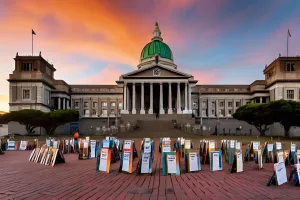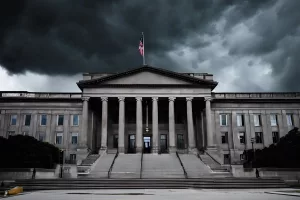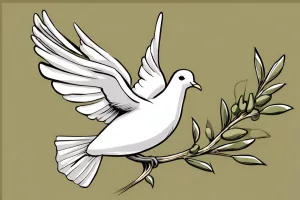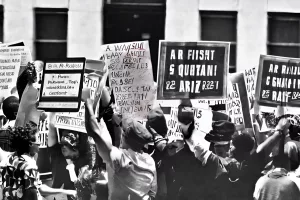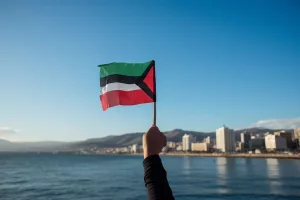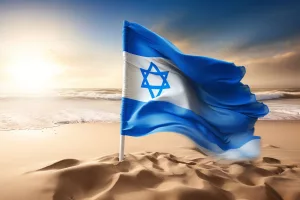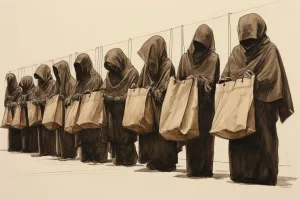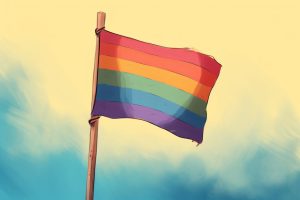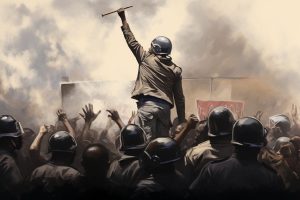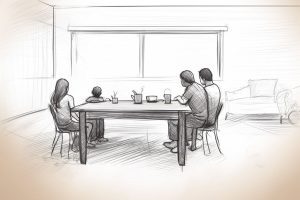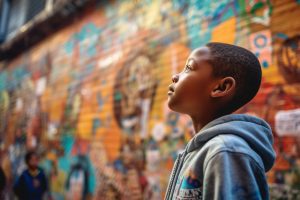The unrest at the University of Cape Town (UCT) is a loud cry for help from students facing tough challenges. They are blocked from registering due to fee issues and struggle to find housing, leaving many without a place to stay. The protests, led by the Economic Freedom Fighters Students’ Command (EFFSC), highlight the deep inequalities in South Africa. Students are demanding change, hoping UCT will listen and act on their needs for a fair education. Their fight echoes past movements, showing the power of unity in seeking justice and equality.
In Cape Town, a vibrant crowd rallied together to protest against ties with Israel, calling for justice amid ongoing violence in Gaza. Marching under the hot sun, they carried bold signs demanding an end to apartheid practices and recognition of Zionism as a racist ideology. The demonstrators, driven by their shared history of struggle against oppression, urged South Africa to adopt the Apartheid Convention and push for a ceasefire. Their powerful messages echoed a global cry for peace, intertwining art, history, and activism to inspire change and unite people for a common cause.
The protest outside Leeuwenhof was a loud and passionate plea for justice, focused on the urgent need for social housing in the Western Cape. Hundreds of determined voices gathered in the early morning chill, demanding action from Premier Alan Winde to address a housing crisis that affects over 600,000 people. With banners and songs echoing the struggle against inequality, they sought to reclaim their dignity and rights. The protest wasn’t just about homes; it was a powerful stand against the unfairness that keeps the poor from having a place to live. As they stood together, they sent a clear message: they will not back down until their voices are heard.
Thousands of people gathered in Cape Town to protest against the ongoing crisis in Gaza, particularly the Rafah invasion. South Africa has taken a significant role in the crisis, with the International Court of Justice commanding Israel to cease military campaigns in the Rafah Governorate. The human cost of the conflict has been horrific, with approximately 35,000 Palestinians, mainly women and children, falling victim to the war. The Cape Town protest was a powerful demonstration of unity and dedication to halt the assault on Gaza and liberate Palestine.
Protests have played a significant role in the history of South Africa’s fight for justice and fair treatment. The psychology behind the South African protest movement, known as the toyitoyi, stems from a sense of dissatisfaction and the pursuit of fairness. When protests are done correctly, they can be a powerful form of expression, highlighting the potency of speaking out, the power of collective action, and the effectiveness of peaceful resistance. The right to protest is guaranteed by the South African Constitution, and protesters must comply with legal requirements for a safe and authoritative platform.
The IsraelPalestine conflict sparks a new battle in Cape Town’s Sea Point Promenade, as proPalestinian advocates are met with water cannons from law enforcement in anticipation of a proIsrael rally. South Africa supports United Nations resolutions for Israel’s withdrawal from occupied territories, and ANC SecretaryGeneral Fikile Mbalula rallies with 250,000 proPalestine advocates in Cape Town, calling for the Israeli ambassador’s expulsion and Prime Minister Benjamin Netanyahu’s arrest. The events at Sea Point Promenade depict a city grappling with the complexities and implications of the global crisis.
A proIsraeli protest turned chaotic when proPalestinian counterprotesters arrived at Sea Point Promenade in Cape Town. Tensions rose between the two factions, and law enforcement had to intervene with stun grenades and pepper spray. The protest was one of many worldwide demonstrations in response to Israel’s bombing of Gaza, causing thousands of deaths. Mayor Geordin HillLewis condemned the violence and called for tolerance, while Reverend Barry Isaacs advocated for peace and a mutual understanding between the two sides.
In Cape Town, protests have erupted in support of Gaza, with demands for an immediate ceasefire and humanitarian aid passages. The protesters also call for the South African government to shut down the Israeli embassy, bring charges against South African residents serving in the Israeli Defense Forces, and back the Boycott, Divestment, and Sanctions movement against Israel. The protests have gained traction, with massive crowds flooding the streets of Cape Town, and have been characterized by a remarkable sense of solidarity, transcending political and religious divisions.
Malawi, a southern African nation, has witnessed widespread protests against LGBTQ+ rights. Organized by the Catholic Church and other religious groups, thousands of protesters took to the streets in major cities, including Lilongwe, Blantyre, Mzuzu, and Zomba. The demonstrations, which brought together approximately 5,000 protesters, were simultaneous and aimed to oppose homosexuality. This protest came amidst an ongoing court case challenging the constitutionality of the country’s laws on homosexuality.
In Nairobi, law enforcement officers took positions amidst growing tension as Kenyans gathered to voice their opposition to the newly imposed tax laws. However, the government refused to listen and banned opposition protests, setting the stage for a violent confrontation.
Cape Town is a city known for its vibrant artistic community and cultural events. Anna Olivier, a professional dancer, actress, and singer, recognized the untapped potential of this community and founded The Playroom Company. The organization’s mission is to empower local artists and creatives by fostering collaboration, inclusivity, and accessibility.
The Community Work Programme (CWP) workers have recently protested outside the Department of Cooperative Governance and Traditional Affairs (COGTA) in Pretoria due to delayed payments for April. This has brought attention to the situation of thousands of South African workers who rely solely on the CWP programme for their livelihoods. According to reports, over 260,800 CWP workers across the country have been affected by payment delays, which typically occur around contract renewal time. The delay is due to the CWP programme’s transition from an implementing agent to the COGTA.
The Supreme Court of Appeal (SCA) in South Africa has ruled that public display of the old South African flag is considered hate speech, unfair discrimination, and harassment based on racial grounds. This decision reinforces the country’s stance against racist behavior and conveys that such actions will be dealt with firmly.


